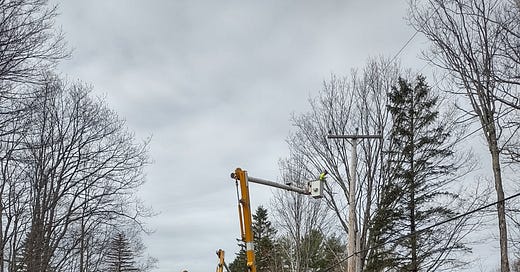As the Fellowship sailed downstream away from her, Galadriel sang in lament of Middle-earth and the fading elves. They heard her song remote in passing on toward their fearful quest and duty. Distantly Frodo saw her arms upraised; and clear on the wind, he heard her singing ancient words, understanding their beauty yet he was not consoled. Long after, remembering the elvish words, he was able to interpret them. (And I in turn roughly paraphrase her lament to use it as my own.)
“Who now shall fill my cup? Oh, the falling leaves of gold! like years passing as sweet draughts....”
Maine is changing. I knew this on beginning a cycle of fiction, set in a fictive Maine “rural town in transition.” This is the major theme of The God’s Cycle. It was a very slow process, after moving to Maine’s western mountains, but, through reading and experience, I began to see and understand the character of Maine as it had been since the beginning of settlement... and then, coming intoa new developmental and resort community, I sensed its transitioning.
Now transition is a permanent state, not just for Maine but for every place. The beauty of stasis, with regard to character, is done away and transition is the new permanent. We are permanently transitioning.
On Maineiacs and Mainers:
One way things change is through ignorance. I wouldn’t like to see the word “Mainer” disappear. However, being "urban," the online Urban Dictionary has its terms confused. When we moved here people like us, who came ‟from away,” might call themselves Maineiacs to distinguish between Mainers and themselves—people from away who are passionate about this place and its old ways.
Accompanied by a slight feeling that one was unworthy to call oneself Mainer, the designation Maineiac meant admiration of Mainers and Maine, meaning the character of people and place. Overall this feeling was not returned, as you can see from the seeming pejorative: “From away.” However, it needs to be stated emphatically, that on the individual level, people were kind, helpful, generous, granting a certain amount of attention on how to live here. We were introduced to Maine’s ways on so many levels: woods work, fishing and hunting, tips on scarce jobs, invites to social gatherings, and the granting of historic and otherwise information. Still, in a general way, there was the “from away” bias, and a healthy variety of both good humor and bad on the part of those who experienced it. For instance, people from Massachusetts were called “Massholes.” Fortunately, we were from the Rust Belt in Ohio.
“From away,” is no longer much viable, as there is a huge influx of people “from away.” Yet some distant eastern and rural communities, where this has not happened, really seem to call for some of this designation.
Rising property taxes necessary to support infrastructure is the reason for some towns disbanding. Giving up formal incorporation. Local roads, bridges, schools and stewardship maintenance costs have escalated beyond what rural towns can afford. Maine’s population is aging, and with fixed incomes. Are Maine’s eastern upland rural Towns in need of new residents? That would depend, in my own thoughts and concerns, on what kind of new residents. I think mainly of income, its sources, and especially of the moral qualities new residents might bring. If the wealthy were to come here, they may bring controlling thoughtless tyranny. If newcomers are non-working poor, an additional burden.
Other considerations are less important, or maybe of no importance. Ethnicity, for instance, is of no importance. To the Amish from Ohio, whose native language is still a dialect of German, we are the Englischer. The Amish seem a complementary and well-integrated population here, on account of moral qualities, including work ethic. These qualities are highly reminiscent of qualities found in Maine’s founding, and in the founding of these rural towns. But, given my own thoughts and concerns, still it’s not my say. I can only watch, and witness. And I will.
Connect all this to the passing of a course I audited at Mythgard Institute? I have enjoyed Tolkien’s Wars and Middle-earth (Fall 2015) tremendously—and learned much about influences upon Tolkien’s work. Because at Mythgard and Signum University they go deep. I feel something of an almost elegiac regret that author John Garth’s course is over. And I’ve seen in it, through his scholarship on JRRT’s early works, a great loss for Tolkien after the Great War with the passing away of his friends, and the rural life of his childhood in community. Tolkien describes how the elves had deep longing to keep things from changing, and to keep the beauty of their Elven home in place. He felt that and also saw its impossibilities. And it is the same for us in Maine now. Now that the character of this place is changing.
... Then there is Brigadoon. Perhaps something could be done with that? Or in intimation, let us say? What I need is for one day to equal 100 years, and 100 years to equal a day. For you must know that I believe in Perfection. There will be a Making when a Crystalline State Of Perfection will be achieved. And inconsolable longing done away. Miraculous that, you say? Unfathomable? Yes, but so is continual change.
This was taken by our relative, a flagger, working in Wales Maine
The landscape here is much more like that of Ohio than the Western Mountains where we now live. It filled me with longing for rural Ohio




